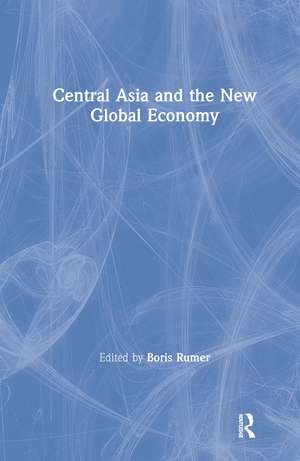Central Asia and the New Global Economy: Critical Problems, Critical Choices
Autor Boris Z. Rumeren Limba Engleză Hardback – 31 iul 2000
Preț: 554.64 lei
Preț vechi: 742.17 lei
-25% Nou
Puncte Express: 832
Preț estimativ în valută:
106.13€ • 113.49$ • 88.49£
106.13€ • 113.49$ • 88.49£
Carte tipărită la comandă
Livrare economică 18 aprilie-02 mai
Preluare comenzi: 021 569.72.76
Specificații
ISBN-13: 9780765606297
ISBN-10: 0765606291
Pagini: 304
Dimensiuni: 152 x 229 x 25 mm
Greutate: 0.57 kg
Ediția:New.
Editura: Taylor & Francis
Colecția Routledge
Locul publicării:Oxford, United Kingdom
ISBN-10: 0765606291
Pagini: 304
Dimensiuni: 152 x 229 x 25 mm
Greutate: 0.57 kg
Ediția:New.
Editura: Taylor & Francis
Colecția Routledge
Locul publicării:Oxford, United Kingdom
Cuprins
1. Economic Crisis and Growing Intraregional Tensions 2. The Economic Development of Central Asia in the 1990s 3. Basic Problems of Market Transition in Central Asia 4. Adapting to Globalization 5. Foreign Trade and Investment 6. Kazakhstan and Uzbekistan: The Economic Consequences of Membership in the World Trade Organization 7. Central Asia and the Asian-Pacific Region 8. Central Asia: Midterm Economic Prospects
Descriere
This volume analyzes the geopolitical and macroeconomic situation in Central Asia, local policy responses to crisis, and alternative scenarios for the foreseeable future. Particular attention is devoted to Kazakhstan, Turkmenistan and Uzbekistan.
